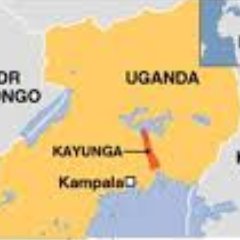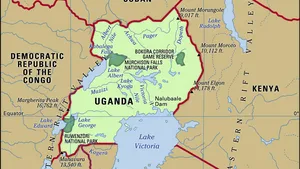Many of my postings on this site refer to reported or suspected ritual murder cases in West Africa. However, this phenomenon dating from ancient times also exists in other regions of Sub-Saharan Africa. Superstition and the greed for power, wealth or good health constitute the main driving forces behind the crimes of ritual murder, human sacrifice and/or ritual cannibalism.
In East Africa ritualistic murders are rife in Uganda. As mentioned below, according to the 2013 Child Sacrifice and Mutilations Report, one child is killed for rituals every week. A mind blowing statistic. Within Uganda the Kayunga District has earned the dubious reputation of being one of the most notorious killing places. Read the breath taking article below; the reader is warned as it contains graphic details.
Uganda is one of an increasing number of SSA countries where human sacrifice and ritualistic murders have become crimes which carry the death penalty. Many countries and international initiatives have outlawed the capital punishment, but several African countries take a different course, notably to contain and/or eradicate ritual murders. The big question is whether the death penalty, which is not always executed, will bring us closer to a society where people no longer fear falling victim to ritual killers. Or should we look for another approach the eradicate this scourge of ignorance and superstition?
PS For an interesting plea to abolish the death penalty the reader is invited to read the following article: ‘Death of Death Penalty in Ghana‘ or click here.
(webmaster FVDK)
Why human sacrifices still thrive in Kayunga

Published: November 11, 2022
By: Fred Muzaale – Monitor, Uganda
What you need to know:
- Police say most victims of human sacrifices are children because they are easier to abduct and seen as “pure” and of “higher ritual value.”
- Last year, President Museveni passed the Prevention and Prohibition of Human Sacrifice Bill 2021, which criminalises the act of human sacrifice.
————————————————————————————————————–
On a hot Monday afternoon at Kayunga Court premises in Kayunga District, Allan Ssembatya walks with his head lowered.
Visibly not in a good mood, he is in the company of a man and a woman. The two grown-ups are his mother and father.
The 19-year-old Ssembatya’s forehead bares a big scar that he sustained after he was cut with a machete by two men during an attempted ritual murder incident in 2009. He was by then 6 years old.
Fortunately, Ssembatya, now in Senior One, survived, but lost both of his testicles. Because of the cut inflicted on his head, he now has persistent headaches and nightmares.
A resident of Busolo Village in Kayunga Sub-county, Ssembatya spent one month in a coma after the incident.
“Doctors who examined him after the attack said he would not be able to bear children. This is purely a case of human sacrifice,” Ms Sarah Tumusiime, the Kayunga Chief Magistrate, revealed during a court session last month.
She sentenced the convicts; Paul Ngaswireki and Awali Kivumbi, both residents of Busolo Village, who were found guilty of committing the offence, to 40 years each in prison.
According to Ssembatya’s father, his son was attacked by the two men when he had gone to the garden to harvest a jackfruit. He was later left fighting for his life in a forest.
Ssembatya’s case is the latest among such incidents, but Kayunga District has had numerous human sacrifice-related incidents.
In March 2020, a 60-year-old man in Kakoola Village, Kitimbwa Sub-county, was beheaded and his head taken by unknown assailants.
The torso was later recovered from a bush. Two witch doctors were arrested in connection with this incident although the whereabouts of the human skull is still unknown.
Additionally, a traditional healer in Kisoga Village, Nazigo Sub-county, was arrested in 2018 after five bodies were found buried in his shrine. He was sentenced to life imprisonment by Mukono High Court.
Last year, a father in Bbaale Sub-county was arrested after he allegedly killed two of his children over ritual sacrifice. He confessed to the act claiming he was promised Shs2m.
Ms Beatrice Ajwang, the Kayunga District officer-in-charge of the Criminal Investigations Department, said most of the suspects arrested in connection with such acts are “traditional healers and people who want to get rich quickly”.
Ms Ajwang said most victims of human sacrifices are children, apparently because they are easier to abduct and seen as “pure” and of “higher ritual value.”
Without disclosing statistical figures of how many cases of human sacrifice had been recorded in the district, Ms Ajwang confirms that “Kayunga is a hotbed of ritual sacrifice”.
She said out of more than 300 traditional healers operating in the district, their preliminary investigations reveal that half of the number are quacks.
“Kayunga is a unique area, you will find many households having shrines on top of being multi-ethnic. This could be a major contributor to these acts,” Kayunga chairperson Andrew Muwonge said.
Ms Ajwang said despite enacting laws to crack down on those engaging in human sacrifices, the practice has continued.
The law
Last year, President Museveni passed the Prevention and Prohibition of Human Sacrifice Bill 2021, which criminalises the act of human sacrifice.
The legislation was moved as a private member’s Bill by former Ayivu County legislator Bernard Atiku with the intent of addressing the growing vice of human sacrifice.
According to the new law, any person who mutilates or causes the death of another person for the purpose of performing or furthering a ritual commits an offence and will be punished by the death penalty upon conviction.
“Worse still, it is a big challenge investigating human sacrifice cases because on some occasions it is carried out by parents themselves on their children while in some other cases people are not willing to give information that could be of help to arrest and prosecute offenders,” Ms Ajwanga said, adding: “We appeal to religious leaders to help us instill morals in our people. As police, we have tried to sensitise them against this vice.’’
Ms Sylvia Namutebi, aka Maama Fiina, the national chairperson of Uganda Traditional Healer’s Association, dismisses claims that the acts are committed by people who practice her trade.
“No genuine traditional healer can sacrifice a human being. These are masqueraders hiding in our job. It is our duty to ensure we [genuine healers] weed out such bad people,” Ms Namutebi said.
She said with the help of genuine healers, they have arrested and prosecuted such ‘wrong elements’, noting that she is on a country-wide tour to sensitise traditional healers on professional ethics.
Mr Peter Mawerere, the Kayunga deputy Resident District Commissioner, blamed the vice on ignorance, greed, and poverty. He noted that many people sacrifice human beings because they think it will make them wealthier.
“It is surprising that many people go to traditional healers when they fall sick, even when their ailments can be treated by qualified medical personnel,” he said.
“We have tasked the leadership of traditional healers to fight the acts, which we highly believe are perpetuated by some of their members,” he added.
Rev Fr Maurice Kigoye, the parish priest of Kangulumira Parish in Kangulumira Sub-county, said: “It [human sacrifice] is really an inhuman act. How can you think that when you kill a person and drink their blood, you can get rich? As religious leaders, we have tried to lure them [culprits] to turn to God and get saved,” Fr Kigoye said.
NGO role
Mr Peter Sewakiryanga, the executive director of Kyampisi Child Care Ministries (KCM), said his organisation receives a number of human sacrifice cases from Kayunga District every month.
“We work with probation officers, police, and other agencies who bring to our attention such cases,” he said.
Mr Sewakiryanga added that in a bid to ensure the culprits are arrested and prosecuted, his organisation facilitates investigations carried out by police officers.
“Many such cases die at the investigation stage, but with our support, a number of the suspects have been prosecuted and convicted like the recent one of Ssembatya. Court sentenced the convicts to 40 years each in jail,” he said.
He explains that KCM also offers treatment, counselling, and psychosocial support to survivors of ritual sacrifice.
“We have in some cases relocated families of the victims for their safety, built them houses and offered education to survivors,” Mr Sewakiryanga said.
2013 report
According to the 2013 Child Sacrifice and Mutilations Report, one child is killed for rituals every week.
The report indicates that people carry out human sacrifices to seek wealth, among others.
Source: Why human sacrifices still thrive in Kayunga


